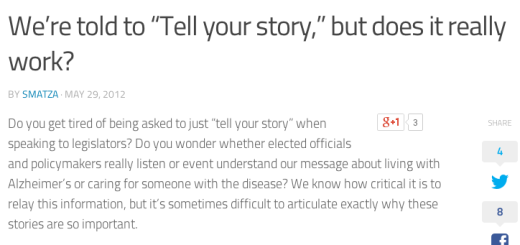Finally! Alzheimer’s is getting attention, and lots of it
Although there are occasional reports about a scientific breakthrough or positive legislation that’s been enacted, most stories about Alzheimer’s contain bad news. That makes me rejoice! Say what? That probably sounds perverse, so let me give you an example.
On April 4th, the New York Times’ front page screamed this headline: “Dementia Study Predicts a Surge in Cost and Cases.” Now, this is not news to those of us who have been following these issues for decades. We know that the cost associated with Alzheimer’s is skyrocketing; we know that the number of people with Alzheimer’s is projected to increase exponentially. But the main reason my heart does a little flip when I read such headlines is that – finally – Alzheimer’s is getting attention. And lots of it! And not just in scientific journals, but in mainstream media as well!
To a large extent, you have yourselves to thank for this. It’s your relentless efforts to contact your elected officials, write letters to the editor, talk to your friends and family about what you are going through as you chart the Alzheimer’s course; insist on high quality care; complain when you don’t get the services you deserve, are entitled to, and need; and so on! All this creates a groundswell that cannot be ignored.
Now, barely a week goes by when there is not some news story about, or related to, Alzheimer’s. And the article detailing the results of a new RAND research study, conducted by an economist and financed by the federal government, is important for many reasons. First, it mirrors (although its statistics are slightly different) reports generated by the Alzheimer’s Association regarding the huge, increasing cost and prevalence of the disease. Second, it stands with the Alzheimer’s Association and its tens of thousands of advocates, in stressing the urgency of this crisis. Third, it admits that the “tremendous emotional cost” of Alzheimer’s is simply not talked about.
It almost seemed as though the researcher, Michael Hurd, was shocked by his own results. This study shows that the 3.8 million people today age 71 or older with Alzheimer’s will balloon to 9.1 million by 2040. And, direct health care expenses for dementia were higher than both cancer and heart disease. Such expenses will more than double by 2040 to a range of $379 billion to $511 billion, from $159 billion to $215 billion in 2010. Dr. Hurd also recognized that the nature of informal care was both more intensive and constant than other chronic diseases.
It’s vitally important for all of these truths to be confirmed by an independent research group such as RAND, so I can only wonder whether the study will finally prompt this country to realize that the seriousness of the Alzheimer’s trajectory is something that requires immediate and bold action. The crisis must be embraced and real solutions must be found, today.
Dr. Hurd, an economist, says that economists can be “cold-hearted,” and admits his team could not capture the “full toll of the disease.” The paper did not include, for example, the tremendous emotional cost” of Alzheimer’s. Even he, as an economist, recognizes that the emotional burden must be put in the equation. Let’s insist that further studies do just that.

















